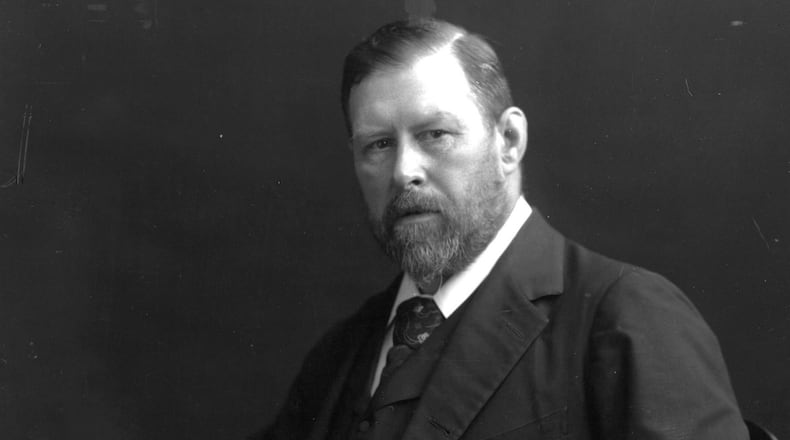If things seem a little spookier at the Emory Library, that’s because Dracula is in the house.
The immortal bloodsucker is prominently displayed in an exhibit at the main entrance, celebrating the acquisition of a treasure trove of papers from his creator, Bram Stoker.
This week Emory University announced the acquisition of the Stoker collection, which arrived on campus just in time for Halloween.
The collection comprises nearly 4,000 items connected to the Irish author, including correspondence, unpublished manuscripts, playbills, first edition translations of “Dracula” and perhaps 1,500 books. It will become part of Emory’s extensive literary holdings, housed in the Stuart A. Rose Manuscript, Archives and Rare Book Library.
Credit: Emory University
Credit: Emory University
The material was acquired from Irish collector John Moore, who sold it with the help of the famous Kennys Bookshop in Galway.
“John Moore spent 40 years tracking every document, book and ephemera that he could find related to Bram Stoker, and put it together in one place,” said Rose Library director Jennifer Gunter King.
“This material that has been painstakingly collected is now available to everyone.”
Stoker’s creation has appeared in musicals, comic books and more than 300 movies and is one of the most durable fictional characters of modern times. Though known only for the 1897 epistolary novel “Dracula” (until the last minute the working title was “The Un-Dead”), Stoker was the author of 18 books, and the collection includes first editions of all of these, many with marginalia in Stoker’s hand.
King said the collection will be valuable for those studying popular culture, the occult, the rise of literacy, cinema, theater studies, Irish Studies, sociology and other fields.
Emory professors Sheila Cavanagh and Joonna Trapp are already planning a spring course, tentatively titled, “The Monster in the Library: The Stoker Archives and Dracula,” which will focus on the Bram Stoker collection.
Bram Stoker grew up on the north side of Dublin. He served as business manager of the Lyceum Theatre in London, and personal assistant to the theater’s star, actor-manager Henry Irving. The charismatic Irving was widely considered to be an inspiration for the character Count Dracula.
Credit: Emory University
Credit: Emory University
Emory’s connection with the Stoker material came from a familiar source. Stuart Rose, a 1976 graduate of Emory’s Goizueta Business School, has a personal library of rare and antiquarian books, and has donated many valuable volumes to Emory, including rare editions of Charles Dickens and Emily Bronte.
He is the former CEO of a Dayton-based alternative energy investment company, and has provided significant funding to support the library. In 2015 it was renamed in his honor.
While scouring the planet for rare books, Rose became aware that Moore was looking for a buyer, and put the Irishman together with Emory. King said she spent about three years in trans‐Atlantic talks, working out a deal.
Rose helped support the acquisition, and added one of his own holdings, a manuscript of the Stoker novel “Our Lady of the Shroud,” written in Stoker’s own hand.
It’s not only legible said King, “It looks like it was penned yesterday. It puts you in the room” with Stoker himself.
Emory will not have a monopoly on Stokeriana. The original manuscript of “Dracula” was somehow rediscovered in a barn in Pennsylvania during the 1980s, and was purchased by Microsoft co-founder Paul Allen at a private auction.
There is also a cache of Stoker’s personal papers at the Rosenbach library in Philadelphia, at the British Library in London, and in the hands of the Stoker Estate. Stoker’s descendants market a variety of branded products, such as a Bram Stoker bobblehead.
King has been in touch with all these groups, including the Allen family, and has hopes that they will collaborate on exhibits in the future. She also sees the presence of the Stoker collection at Emory as an inducement for additional donations from other collectors who wish to see Stoker’s legacy preserved in a place that makes it accessible to the world.
Emory’s collections are available to anyone with a research interest, through the open-by-appointment-only Reading Room. Reading Room hours are 9 a.m.-5 p.m. Mondays-Fridays. The library is at 540 Asbury Circle, Atlanta. rose.library.emory.edu
About the Author
The Latest
Featured




